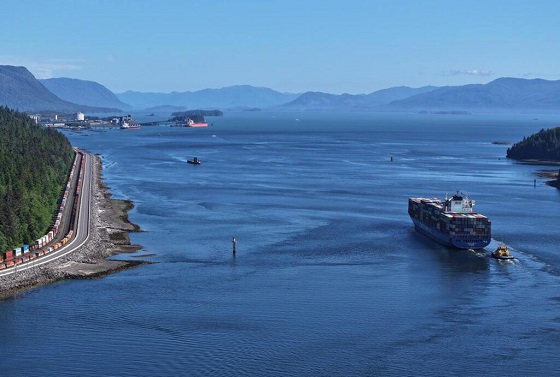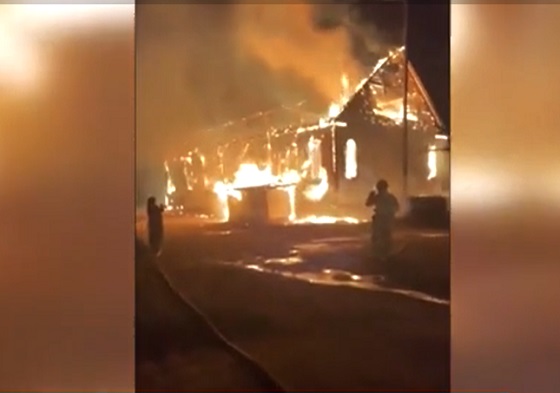Energy
Free Speech Was Curtailed In Canada. Did You Notice?

From the Frontier Centre for Public Policy
We’ve seen this before, of course… The Soviets under Lenin and Stalin, and Maoists in China made denunciation commonplace. Don’t like someone? Denounce them for anti-revolutionary speech and have them hauled off to the gulag for 10 years
In the waning days of June, the federal Liberal government, supported by the New Democratic Party, passed legislation to take away some of the rights to free speech in Canada.
Bill C-59 was an omnibus budget bill, which meant its passage was assured lest the government fall. And there are some amendments to the Competition Act within C-59 which are effectively a gag law for you, me, and everybody else.
Gag law
I honestly wasn’t aware of it until Minister of Justice and Attorney General Bronwyn Eyre held a press scrum at the Saskatchewan Oil and Gas Show on June 5 to talk about this. She called it a “gag law,” and it has become evident those were very fitting words.
The additions to the budget impact the Competition Act, for the purpose of eliminating “greenwashing.” The significant clauses state:
“A person engages in reviewable conduct who, for the purpose of promoting, directly or indirectly, the supply or use of a product or for the purpose of promoting, directly or indirectly, any business interest, by any means whatever …
“(b.1) Makes a representation to the public in the form of a statement, warranty or guarantee of a product’s benefits for protecting or restoring the environment or mitigating the environmental, social and ecological causes or effects of climate change that is not based on an adequate and proper test, the proof of which lies on the person making the representation;
“(b.2) Makes a representation to the public with respect to the benefits of a business or business activity for protecting or restoring the environment or mitigating the environmental and ecological causes or effects of climate change that is not based on adequate and proper substantiation in accordance with internationally recognized methodology, the proof of which lies on the person making the representation.”
The penalties for a corporation can be up to three per cent of global revenue.
Charlie Angus’ influence
The Bill was introduced last November, but these portions were amended since then. And you can see from a briefing submission from the environmental lobby, some of their suggestions were implemented.
It also seems to be an extension of Charlie Angus private members bill, which was banning the promotional petroleum in early February. I think that was a trial balloon. No one really thought anything would come of it, but the essence of that bill was already in Section 236 of C-59, with amendments made at the very end of the budgetary process.
This move seems to be a back-door implementation of NDP MP Charlie Angus’ private members bill, Bill C-372, which sought to shut down all oil and gas advertising. Angus’ press release said, “Passage of Bill C-372 will mean that no fossil fuel company will be able to advertise, promote their products, nor mislead the public about the health and environmental threats posed by the burning of fossil fuels, which the World Health Organization now says is the biggest global health threat of the 21st century.”
Isn’t that eerily similar to the clauses noted above?
Saskatchewan calls it a gag law
Eyre told reporters on June 5, “This is a gag law. It’s a federal gag law. It’s Charlie Angus’ fossil fuels advertising act in another form, and it is very serious. That’s what the letter expresses, our profound alarm at this rushed bill, Bill C-59, which is part of an omnibus budget bill. It was rushed, it was done without consultation with any of the provinces. And it could have a very profound effect, very sobering effect harmful effects on our economy, frankly, so very, very concerned about C-59.”
Premier Scott Moe posted on social media on July 2, “It’s a wonder why the federal government would want to put a gag order on Saskatchewan oil and gas companies when they are having great success with their emission reductions. In fact, our energy sectors greenhouse gas emissions last year were 67 per cent below levels reported in 2015. Our government will continue to fight against the Liberal-NDP Coalition Bill C-59 plan in order to protect Saskatchewan’s energy sector.”
Such a statement, made by a provincial premier, no less, could possibly be considered afoul of the law, if he had made these statements after June 20, 2025, when the law is implemented.
Did Moe quote “proper substantiation in accordance with internationally recognized methodology?” After all, according to the law of the land now, “the proof of which lies on the person making the representation.”
It’s a wonder why the federal government would want to put a gag order on Saskatchewan Oil and Gas companies when they are having great success with their emission reductions.
In fact, our energy sectors greenhouse gas emissions last year were 67 per cent below levels reported… pic.twitter.com/FEHFM9CQsb
— Scott Moe (@PremierScottMoe) July 3, 2024
Jordan Peterson persecution
The implementation of this law is essentially modelled on the persecution (and I don’t use that term lightly) of Dr. Jordan Peterson.
As noted by the National Post, Dr. Peterson’s plight was that the “College of Psychologists of Ontario that ordered Jordan Peterson into a mandatory rehabilitation program for his politically incorrect tweets, which had nothing to do with his practice and involved none of his patients.”
Among the complaints made against him was the submission of the entire transcript of his appearance on the Joe Rogan Experience podcast! And an Ontario court backed up the College’s prosecution (persecution?) of him!
Bill C-59 conjures up a similar system. As energy advocate Deidra Garyk writes in Pipeline Online, “While focus has been on the muzzling of oil and gas supporters and companies, this bill is agnostic and, therefore, allows all industries to be targeted. Although, oil and gas is likely to be disproportionately aimed at and penalized since anyone can go onto the Bureau’s website and easily complete a complaint form. You do not have to be a victim to file a complaint, meaning a company can be accused of a victimless crime.”
Communist-style denunciation
We’ve seen this before, of course, long before Peterson’s problems. The Soviets under Lenin and Stalin, and Maoists in China made denunciation commonplace. Don’t like someone? Denounce them for anti-revolutionary speech and have them hauled off to the gulag for 10 years, but only if they don’t catch a bullet behind the ear, first.
Process is the punishment
While Canadians aren’t likely to catch a bullet, yet, this is a situation where the process is the punishment. It doesn’t matter if the complainants win. All they have to do is initiate the process, and you are in a world of hurt.
And trust me, they will be filing complaints. Expect groups like Ecojustice, Sierra Club, and Greenpeace to be lining them up as we speak. In December, several of them, including Ecojustice, submitted a briefing note “amending Bill C-59 to more effectively combat greenwashing.”
A few clicks online and bam! You’re tied up in litigation that’s from tens to hundreds of thousands of dollars.
And even if you win, you still lose, because you’ve paid all that money for the lawyers and the time and effort.
And in the meantime, while you’re in litigation, you’re not going to say a damn thing until it’s resolved. So, you have effectively been muted until the court process, which is never quick and efficient, is dealt with. Again, the process is the punishment.
Easier to say nothing, ever
Now, the solution for most people, and most companies, will realize is that it’s easier not to say anything at all, which effectively silences you. As Eyre said, this is a gag law.
And you know what really, really troubling?
Some of the largest companies in Canada, corporations with literally floors of lawyers among them, folded like a house of cards as soon as C-59 became law. The Pathways Alliance, made up of the six largest oilsands producers, promptly wiped their website clean. The Canadian Association of Petroleum Producers, on June 20, said it “has chosen to reduce the amount of information it makes available on its website and other digital platforms until the Competition Bureau has released further guidance on how these amendments will be implemented.”
So the gag has been thoroughly applied, already. Spines, and perhaps some other bodily parts, are notably absent.
And these are the organizations with by far the largest resources to fight this assault on free speech. Instead, they issued press releases. Big deal. That press release should have said they will fight this tooth and nail. Instead, They’ve already all but given up.
So what the hell am I supposed to do, working in my basement as a one man band? I have no financial resources to pay for any sort of legal fight.
How the hell am I supposed to fight this when the people who have all the resources in the world, in this country have said, “Oh, we’ll put up a press release saying, ‘We don’t like this, but we’re not going to do anything about it.’”
I’ll tell you what my defence is, should I, or my corporation, Pipeline Online Ltd., have a complaint issued under this legislation: Section 2(b) of the Canadian Charter of Rights and Freedoms. It states, “Everyone has the following fundamental freedoms: (b) freedom of thought, belief, opinion and expression, including freedom of the press and other media of communication.”
That includes the right to say whatever you want about “protecting or restoring the environment or mitigating the environmental, social and ecological causes or effects of climate change.”
And under Canadian law, corporations have rights, too.
ESG as the rope to hang you
And here’s another twist: in the last four years, environment, social and governance, or ESG statements or reports have went from non-existent to required if you expect any sort of institutional investment. No ESG report; no money, honey.
But these very reports, the ones making companies’ environmental cases, will now be rope with which the likes of Ecojustice and Greenpeace will hang them. Now if you publish an ESG statement, your critics can use that as evidence to prosecute you. So you’re damned if you do, and you’re damned if you don’t. If you don’t put out an ESG statement, maybe you’ll lose all your investors. And if you do publish it, well, maybe you’ll get prosecuted by this for saying the wonderful stuff that you have tried to do for the environment.
What if a journalist like me comes around and does a story on your company? Let’s give a real example. Several years ago, a drilling company which no longer exists called CanElson converted many of it rigs to operate on dual-fuel; diesel and compressed natural gas. And one of the reasons cited at the time when I wrote about it was the environmental benefits from lower emissions. But now, lawyers would almost certainly tell them everything they say would have to be couched with “proper substantiation in accordance with internationally recognized methodology.” In other words, mountains of fine print. But no press organization is going to publish all of that, and the company would have no control over what is published. So that company’s lawyer would, according to the new law, obviously advise their clients to say nothing, ever, to any media where it could be published, lest they open themselves up to prosecution under the Competition Act, as amended by Bill C-59.
Again, a gag law.
1984
This is really an implementation of George Orwell’s 1984, where groupthink has been legislated into law a couple week ago by the federal government. If you say anything against the current orthodoxy of anthropogenic climate change, or even if your efforts to support it are found insufficient, you are an apostate and can be prosecuted for it.
This is not hyperbole. This has really happened.
Your freedom of speech, today, is dramatically reduced from what it was on June 19.
And we allowed it to happen.
Authoritarian pattern
This reminds me of how the Russian Revolution evolved under the Soviets, as recorded by Aleksandr Solzhenitsyn’s The Gulag Archipelago. First they came for the Mensheviks, then the socialists. Then they came for the bourgeois business owners and clergy. Next were the engineers, which were called “wreckers,” as well as the intelligentsia. Then they came for the kulaks, which were farmers who had as few as three cows, leading to the Holodomor. Then they came for the military, in the great purge.
This is the route authoritarianism takes. Free speech is the first to go. What comes after that?
I’ve been talking to a number of people about this in recent weeks. Some have suggested working within the system as it now exists, under the new changes to the Competition Act. Some have suggested using the new rules to fight back, making complaints about the green lobby, instead.
That’s a fool’s errand. You’re co-opting the authoritarians’ plan. Just like the Jews who dutifully donned their yellow Stars of David. If we just do what they tell us to, work within their new rules, maybe they’ll leave us alone.
How did that work out?
I wore a uniform as a reservist officer in the Canadian Forces. I may have been the lowest form of reservist officer, but I still wore a uniform for seven years, and there’s no way in hell I am going to be gagged by my own federal government for being able to say what I’m going to say.
And the fact that CAPP and the Pathways Alliance folded on this like a cheap house of cards, is all the more troubling. They’ve just been handed the environmental equivalent of a yellow star, and they dutifully put it on.
Will you do the same?
Brian Zinchuk is editor and owner of Pipeline Online, and occasional contributor to the Frontier Centre for Public Policy. He can be reached at [email protected].
Business
Canada has an energy edge, why won’t Ottawa use it?

Energy abundance, properly managed, isn’t just Canada’s strategic edge—it’s our ace in the hole while allies scramble to rearm their energy systems and competitors sprint ahead. We can keep sleepwalking through the annual ritual of self-imposed shackles, watching golden opportunities slip through our fingers, or we can finally show up as a serious player in the energy security game we’re already knee-deep in.
What the public doesn’t see behind all the climate summit fanfare is a carefully choreographed performance where capitals everywhere scramble to perfect their lines for the UN’s annual pageant. COP30 descends on Brazil in mid-November, and once again Ottawa looks primed to arrive clutching a stack of promises, desperately hoping that thunderous applause will somehow count as tangible progress in the real world.
Thanks to years of bureaucratic capture, our government keeps churning out the measures most fervently demanded by the climate lobby, and this ritual proceeds as if “net zero” were still a credible roadmap rather than a marketing slogan stretched so transparently thin it’s practically see-through. But out in the real world—away from the theatrical staging—the energy system keeps issuing updates of its own that no amount of wishful thinking can erase. The question this year cannot be what flashy new prohibition Ottawa can unveil on cue: are our leaders finally prepared to read the room? Away from the virtue-signalling theatre, countries are quietly adjusting to immovable realities: demand keeps climbing, reliability actually matters, and security trumps sermonizing—and we should be looking south to see what’s really working.
From 2005 to 2023, U.S. per-capita CO₂ emissions from energy plummeted by nearly a third. Not because of performative pledges or green grandstanding, but because coal quietly gave way to natural gas, with renewables filling in around the edges where they actually made sense. Pick almost any grid that made this pragmatic switch, and you’ll discover the same inconvenient pattern that climate absolutists prefer to ignore: fewer emissions and electricity you can actually count on when you flip the switch. Maryland serves as a clean example, where coal shrank from the backbone to a footnote as gas surged, helping keep the lights blazing when people needed them most.
Canada should pay very close attention to these uncomfortable truths. We benefit from hydro and nuclear in some regions, but what the green lobby doesn’t want to acknowledge is that our electricity demand is climbing relentlessly. Population growth alone would guarantee that outcome. Add the explosion in AI technology and it becomes utterly unavoidable, despite the silence from environmental groups. Even the cheerleaders of the new digital economy are brutally honest about this reality when pressed. The head of the world’s biggest AI chipmaker isn’t jesting when he bluntly tells the U.K. it will need gas turbines alongside nuclear and renewables to power its tech ambitions—inconvenient facts that shatter green fairy tales.
Another stubborn reality that doesn’t make it into climate summit speeches is that the International Energy Agency estimates oil and gas companies spend roughly half a trillion dollars every year just to keep output flat—a financial reality that exposes the “stranded assets” narrative as wishful thinking. Without this continual reinvestment, U.S. shale would crater within a single year. It’s rather difficult to describe that as a system drifting quietly into retirement, rather than an industrial backbone that still carries most of the load while activists pretend otherwise. If you’re Canada, that looks less like a looming problem than a golden opening that our competitors are already seizing.
Geopolitics is saying the same thing out loud, for those willing to listen beyond the climate activism echo chamber. J.P. Morgan bluntly calls this the “new energy security age,” and Europe is working frantically to end its dependence on Russian LNG—not for climate reasons, but for survival. Japan is expanding its LNG fleet, and Mexico is inking billion-dollar supply deals while climate campaigners aren’t looking. Strip away all the green branding and virtue-signalling, and you get a core calculation that energy security is nothing short of national security—and countries that get snookered by activist rhetoric into forgetting that harsh reality lose far more than bragging rights at international summits.

The Woodfibre LNG site is seen on Howe Sound in Squamish, B.C. THE CANADIAN PRESS/Darryl Dyck
Our allies have been leaning on us to quit sitting on the sidelines and deliver something concrete. And back home, even Ottawa’s mandarins are finally muttering what everyone else has known all along. For the next several years, at minimum, gas remains the most economical, rock-solid baseload option across vast stretches of the continent. Meeting that surging demand would deliver high-paying jobs, bulletproof alliances, and slash global emissions compared to the world burning more coal. Turning our backs on it means standing idle while rival producers rush to fill the void—all so we can pat ourselves on the back for warming the bench.
If this strikes you as abstract theorizing, cast your eyes toward California. A righteous crusade to shutter refineries didn’t magically eliminate the appetite for fuel—it simply exported the dirty work elsewhere, shipping out the jobs and the supply cushion that shields consumers from price shocks. The Golden State now scrambles like a panicked shopper whenever supply chains hiccup, because when push comes to shove, affordability draws the hard red line on what voters will tolerate. Meanwhile, the global landscape has shifted dramatically, with the United States now claiming the crown as top exporter of refined petroleum and LNG.
The lofty rhetoric of “climate solidarity” has quietly faded into something far more practical—nations ruthlessly pursuing their own interests. Even the most progressive speechwriters now pepper their drafts with buzzwords like ‘pragmatism’ and ‘realism.’ It represents nothing short of a grudging acknowledgment that wishful thinking won’t keep the lights on when the grid starts groaning.
British Columbia, meanwhile, sits perched atop the Montney—one of the continent’s most spectacular gas reservoirs—boasting the shortest shipping lanes to Asian markets. Indigenous nations are shrewdly securing equity stakes in LNG ventures while demanding genuine partnership—a blueprint that marries reconciliation with cold, hard prosperity. Those outbound cargoes are displacing coal-fired power overseas. If your genuine goal involves slashing real-world emissions, that achievement trumps a dozen flowery Ottawa press releases.
So no, the magic formula isn’t “all of the above,” but rather “the best of the above.” It demands deploying hydro, nuclear, and renewables where they deliver maximum punch, with natural gas serving as the indispensable bridge that keeps systems humming while breakthrough technologies mature. We must construct infrastructure that performs when sidewalks turn into skating rinks and when asphalt starts melting like butter.
We’ve also absorbed some hard-earned lessons about the political theatrics that spook serious capital. At COP28 in Dubai, then–environment minister Steven Guilbeault sported a baseball cap emblazoned with “emissions.” Emissions cap—catch the clever wordplay? The joke bombed spectacularly with investors. The policy proposal fared no better; its most vocal champion is reportedly eyeing the exit door, while nearly a hundred Canadian oil and gas CEOs have now fired off two blunt open letters to the new prime minister, spelling out precisely what the cap would accomplish: driving investors to pack their bags for friendlier jurisdictions. If your economic blueprint hinges on attracting capital, avoid crafting policies that essentially scream ‘beat it.’

World leaders at COP29 in Baku, Azerbaijan.
Energy abundance, properly managed, isn’t just Canada’s strategic edge—it’s our ace in the hole while allies scramble to rearm their energy systems and competitors sprint ahead. We can keep sleepwalking through the annual ritual of self-imposed shackles, watching golden opportunities slip through our fingers, or we can finally show up as a serious player in the energy security game we’re already knee-deep in.
What would that look like at COP30? It would sound nothing like the strangely self-defeating Canadian speeches of years past, which have been heavy on confessional hand-wringing, light on genuine intent, drowning in performative self-flagellation, and starved of actual competence. If Ottawa wants to prove it has finally woken up from its ideological slumber, it should ditch the tired theatre and roll out policies that actually unleash investment instead of strangling it: streamlined approvals with firm timelines that mean something; predictable fiscal treatment that doesn’t shift with every political breeze; a clear path for Indigenous equity in major projects; and an explicit commitment to “best of the above” power and fuels. Pair that with a forthright message to allies that cuts through the usual diplomatic fog: Canada intends to supply reliable, cleaner energy to the democracies that desperately need it.
It’s not capitulating to industry to stop pretending we can wish away reality. It’s the path that lets us grow the economy, slash global emissions faster than sanctimonious lectures ever will, and strengthen the alliances that keep free countries from getting steamrolled. If we want Canada to matter in this new energy security age instead of being relegated to the sidelines, we should start acting like we mean business. COP30 is the stage. Time to scrap the old script and write one that actually works.
Energy
Prince Rupert as the Optimal Destination Port for an Alberta Crude Oil Pipeline –

From Energy Now
Assessing the Strategic, Economic, and Environmental Advantages on British Columbia’s Northern Coast
With ongoing discussions about diversifying Alberta’s crude oil export routes, selecting the right destination port on British Columbia’s northern coast is critical. This analysis examines Prince Rupert as a prime candidate, highlighting why it stands out as the best choice for a new Alberta crude oil pipeline.
Geographic and Logistical Advantages
Prince Rupert is Canada’s deepest natural harbour and is located approximately 1,500 kilometres closer to Asian markets than Vancouver. Its northern coastal position provides a shorter and more direct shipping route across the Pacific, reducing transit times and shipping costs. The port’s location also means ships can avoid the congested and environmentally sensitive waters of southern British Columbia, including the Salish Sea and Vancouver’s busy port.
Infrastructure and Expansion Capacity
Prince Rupert has a modern and rapidly expanding port infrastructure. The Port of Prince Rupert already handles bulk cargo, containers, and other exports, and it has significant capacity for further development. There is available land and established transportation corridors—including rail lines operated by CN Rail—that connect directly to Alberta, making it logistically feasible to construct a new pipeline and efficiently move crude oil to tidewater.
Economic Benefits
A pipeline terminating at Prince Rupert would open up Alberta’s crude oil to global markets, particularly in Asia, increasing market access and potentially securing better prices for Canadian oil producers. The economic spin-offs for both Alberta and northern British Columbia include job creation, increased tax revenue, and local business opportunities in construction, operations, and port services.
Environmental and Community Considerations
Shipping crude oil from Prince Rupert avoids some of the most ecologically sensitive regions along the southern coast. The port’s deep waters allow for safer navigation of large tankers, reducing the risk of groundings and spills. Additionally, the relatively low population density around Prince Rupert compared to southern ports minimizes the social impact and opposition that has historically challenged energy projects in more urbanized regions.
Strategic and Security Factors
The northern location of Prince Rupert is advantageous from a national security perspective. It is less vulnerable to geopolitical tensions and traffic bottlenecks that can affect southern ports. The port’s proximity to the open Pacific also reduces the time tankers spend in Canadian waters, limiting exposure to potential environmental incidents.
Prince Rupert’s strategic location, robust infrastructure, economic potential, and lower environmental and social risks make it the best choice for a new Alberta crude oil pipeline on British Columbia’s northern coast. Its selection would not only enhance Canada’s energy export capabilities but also support responsible economic development in Western Canada.
-

 Alberta2 days ago
Alberta2 days agoClick here to help choose Alberta’s new licence plate design
-

 National2 days ago
National2 days agoDemocracy Watch Renews Push for Independent Prosecutor in SNC-Lavalin Case
-

 International1 day ago
International1 day agoHamas will disarm or die
-

 International2 days ago
International2 days agoDaughter convinces healthy father to die in double assisted suicide with mother
-

 illegal immigration1 day ago
illegal immigration1 day agoLos Angeles declares a state of emergency over ICE deportations
-

 International2 days ago
International2 days agoUS Warns Hamas To Halt Executions
-

 Indigenous1 day ago
Indigenous1 day agoConstitutional lawyer calls for ‘false’ claims to end in Canadian residential schools burials
-

 Business1 day ago
Business1 day ago‘Taxation Without Representation’: Trump Admin Battles UN Over Global Carbon Tax







